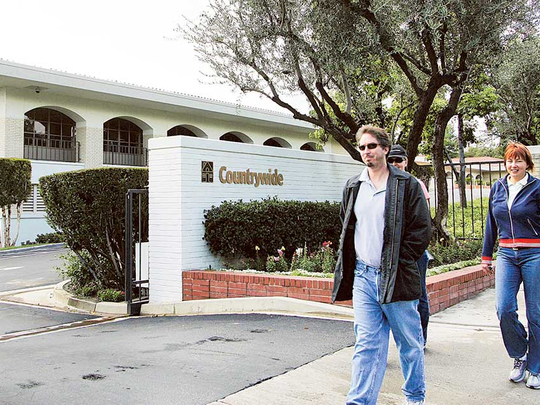
New York: Angelo Mozilo can finally get on with his life.
This month the Justice Department told Mozilo, former chief executive of Countrywide Financial, once the US’s largest sub-prime mortgage lender, that he was no longer under investigation in connection with civil mortgage fraud. The government’s criminal inquiry into Mozilo’s role in the financial crisis was dropped previously, so he is now in the clear.
At least that’s the view from Washington. On Main Street, where the pain of Countrywide’s reckless lending and abusive foreclosure practices still throbs, it’s safe to say that Mozilo is still identified as a major figure in the mortgage crisis.
Countrywide, a freewheeling mortgage machine cofounded by Mozilo and based in Southern California, was at the epicentre of the mortgage meltdown that in 2008 brought the nation’s economy to its knees. The decision by the government to close the book on Mozilo is something of a milestone and a moment to revisit the deeds of the company he cofounded.
His lawyer, David Siegel, emailed this statement, “The government conducted a professional and thorough investigation of possible civil claims, and we are pleased that it decided to close that investigation without another lawsuit.”
Ever since his company collapsed in 2007 and was taken over by Bank of America in a fire sale, Mozilo has steadfastly maintained that neither he nor Countrywide did anything wrong. The operation that he cofounded in 1969 and that made him immensely wealthy simply got caught up in a Force 12 financial gale.
Did Countrywide have a role in creating that storm? Not in Mozilo’s view. On the contrary, his company made America a better place.
“Countrywide was one of the greatest companies in the history of this country and probably made more difference to society, to the integrity of our society, than any company in America in the history of America,” he told federal investigators in a 2010 interview. “And that’s where I spring from.”
What about the thousands of loans with exploding interest rates made to unsophisticated borrowers who had no ability to repay them? The abusive foreclosure practices that increased the burden on struggling people? The shattered lives?
I asked Mozilo’s lawyer whether, years later, his client still believed that Countrywide had done nothing wrong. “Mr Mozilo always has been deeply troubled for the many borrowers who played by the rules and who still suffered during the financial crisis, and any implication otherwise would be unfair,” Siegel said.
“He built Countrywide to help people purchase and stay in homes they could afford, and he was proud of the company’s success in doing that for many years.”
In the last week, I reread and listened to many of the interviews government investigators had with Mozilo after the financial crisis. In those conversations, Mozilo maintained that his company had strong ethical standards.
Privately, however, he took a more nuanced view, often recognising missteps or troubling practices in his company’s operations. In an email to a colleague written in April 2006, for example, Mozilo spoke critically about a situation in which Countrywide had to buy back problem mortgages it had sold to HSBC.
“The loans were originated through our channels with serious disregard for process, compliance with guidelines and irresponsible behaviour relative to meeting timelines,” he wrote.
And they were not the only ones. Internal documents provided by a former Countrywide employee showed that as early as September 2004, lending audits in six of the company’s largest regions identified one in eight loans as “severely unsatisfactory” because of poor underwriting. And that was well before the housing boom.
Mozilo certainly succeeded in creating a profit powerhouse at Countrywide, at least for a while. One reason the company’s stock became a highflier is that Countrywide was a vertically integrated mortgage machine, with an array of subsidiaries poised to wring fees from every stage of the lending and loan servicing process.
Providing in-house appraisals, property maintenance, insurance and other services meant Countrywide could mark up the costs of its services, sometimes by more than 100 per cent, the government found.
Such charges were at the heart of a June 2010 case brought by the Federal Trade Commission against the company. The agency’s determination? Countrywide overcharged almost half a million of its customers.
The strategy was intended to increase Countrywide earnings from default-related services during an economic downturn, the commission said. In other words, if profits from home loan originations fell, Countrywide could make up for it by increasing the burden on its most troubled customers. A choice statistic from this case: Countrywide charged some borrowers in foreclosure $300 to mow their lawns.
“It is astonishing that one single company could be responsible for overcharging more than 450,000 homeowners, which is more than 1 per cent of all the mortgages in the US,” Jon Leibowitz, then chairman of the trade commission, told me in a 2011 interview after Countrywide settled the case. Its business model was “based on deceit and corruption, and the harm they caused to American consumers is absolutely massive and extraordinary.”












